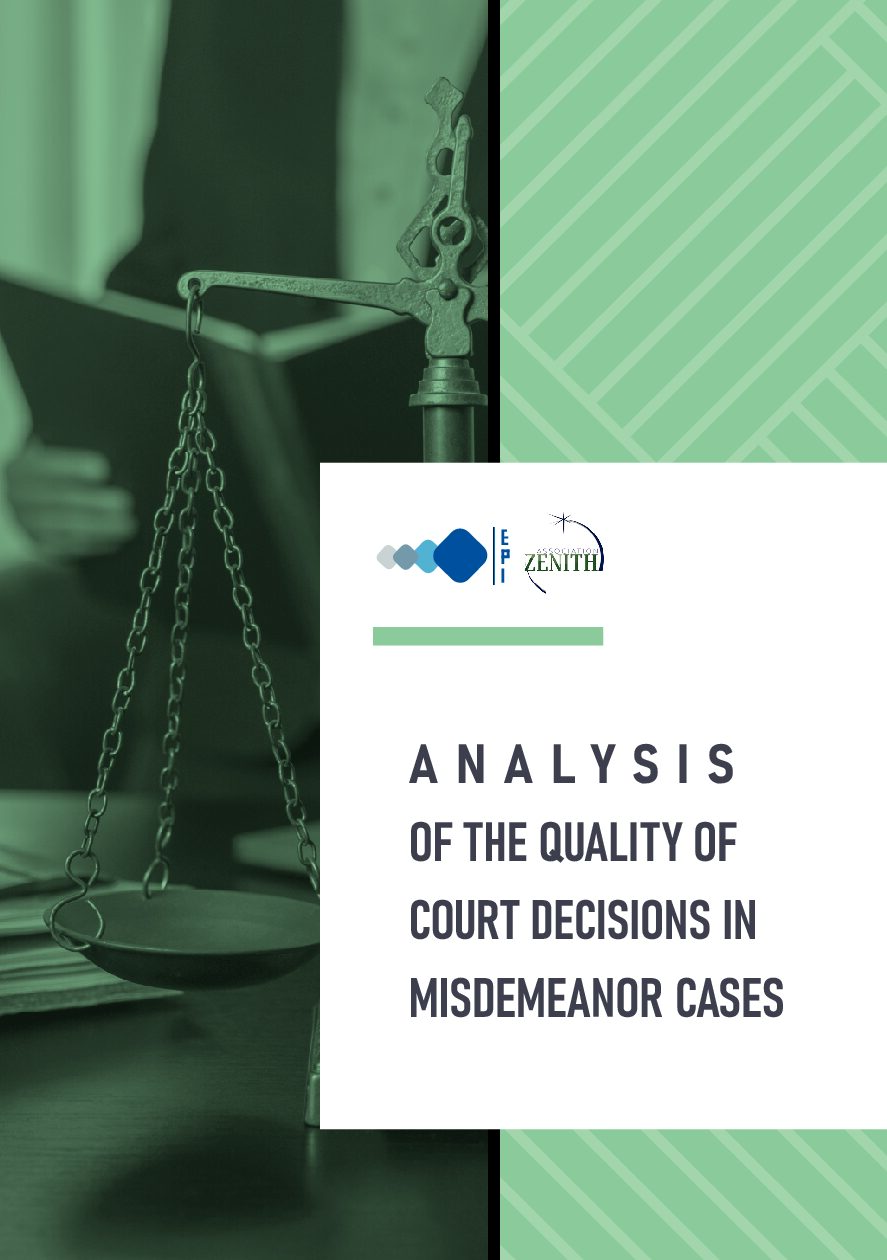The analysis of the quality of court decisions in misdemeanor cases written by Dr. Mariana Loncar Velkova, was made on a total of 60 decisions from four appellate areas, issued in the period from 2017 to 2020, where one of the parties in the proceedings is a natural person.
The analysis was based on a set of qualitative indicators as per the Methodology for Analyzing the Quality and Uniformity of Court Decisions and it does not quantify the results obtained with the quantitative indicators according to the Methodology. Each decision was individually analyzed without being compared with the others, by applying the indicators from the mentioned Methodology.
During the analysis of the court decisions, an assessment was made of the whole decision, each part of it, the manner of presenting the evidence and the existence of contradiction, stating the evidence, determining whether the pronounced misdemeanor sanction is based on legal provisions, ie whether the substantive law is properly applied and whether certain injuries during the misdemeanor procedure were made. The decisions given by the appellate courts were analyzed through the instructions given to the basic court if the case was returned for retrial.
General Findings
- The analyzed judgments from the Court of Appeals Bitola individually contain the necessary parts and are properly structured. Most of the decisions are clear and concise, although there are aberrations in some decisions. The most common aberrations are when the judgment is rendered without reasoning. The decisions of the Court of Appeal Bitola contain clear instructions for the basic courts, the reasons for quashing or reversing the decision of the first instance court are clearly stated, if the sanction is modified a clear explanation for the reasons is given, indicating where is the difference in opinion between the appellate and the basic court. The care is taken to explain the complaint allegations that are not previously explained and answered in the first instance court decision, paying attention to the deadline for absolute statute of limitation.
- In most of the analyzed decisions in the Gostivar Appellate Area, the substantive law is not applied properly, substantial violations of the misdemeanor procedure are made, especially in relation to the reasoning in the decisions. Decisions were erroneously made in absentia, so the defendant did not waive his right to appeal. Regarding the decisions issued by the Court of Appeals that were subject to analysis, we can say that most of them have shortcomings that are of immaterial nature, and some of the regulations in force are applied incorrectly.
- The decisions from the Skopje Appellate Area are concise, clear, understandable and with a sufficient description of contradicting At the same time, laws and explanations are cited and the reasons why the decisions are upheld, reversed, or remanded are explained, taking into account each segment of the decision of the basic court and evaluating it in its entirety, and not only the part that is appealed. The decisions of the Court of Appeals Skopje contain clear instructions for the basic court to reconsider the decision if the decision is remanded, the reasons for quashing or modifying the decision of the first instance court are clearly stated, and the reasoning clearly states why a change was made when the sanction was modified, indicating where was the difference in opinion with the basic court.
- In the Appellate area Stip to a greater extent, the decisions contain the necessary parts and are properly structured, adopted on the basis of substantive law, and the content of the statement takes into account the factual allegations of the parties through the evidentiary procedure. The decisions of the Court of Appeals Stip are short and with fewer explanations compared to the decisions of the Court of Appeals Skopje, but they are still understandable and the application of the laws was taken into account.
In terms of conclusions, the analysis at the national level indicates that the quality of court decisions is basically good despite the shortcomings, in terms of their structure and legal logic, the reasoning of the decision, and the linguistic aspects (linguistic and grammatical correctness). The decisions of the Appellate Areas Skopje and Bitola are of better quality than the decisions of the appellate areas of Gostivar and Stip, which can be seen from the evaluation of the quality of the individual decisions and the conclusions given for each appellate area in the analysis.
We can generally conclude that there is inequality in the court decisions in the appellate areas due to the observed specifics and to some extent differences in conducting the procedure, presentation of evidence, application of legal regulations, linguistic and grammatical aspects, and other characteristics. However, equality before the law and legal certainty are present in many of the analyzed decisions.
Recommendations
- Greater dedication and attention when elaborating decisions;
- Work on harmonization of court practice;
- The Supreme Court should adopt general legal positions, general legal opinions, legal opinions and conclusions and decisions or conclusions of meetings of the appellate courts on certain issues in the misdemeanor procedure in order to establish a uniformed practice and improve the misdemeanor procedure;
- It is necessary for competent bodies better to monitor court decisions in all appellate areas, as well as organizing meetings for the exchange of experience and practice and preparing instructions (guidelines) for certain legal issues;
- Conducting annual comparative analyzes, taking into account all quality and evaluation criteria given in the Methodology for Analyzing the Quality and Uniformity of Court Decisions;
The analysis and the above-mentioned methodology were conducted within the project “Partnership Justitia: Regaining Citizens’ Trust”, implemented by the European Policy Institute and the Association for Development Initiatives – Zenith, which is financially supported by the European Union.

